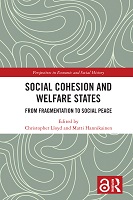Chapter 2 Smooth sailing toward more peaceful societies? Long-run Nordic development paths
Proposal review
Author(s)
Eloranta, Jari
Ojala, Jari
Sabaté, Oriol
Language
EnglishAbstract
In this chapter, we aim to compare the Nordic societies in a broad fashion in the last 200 years in their process of “sailing” (with the implication of rough waters along the way) from social fragmentation to more inclusive welfare societies. Our main goal is to examine the co-evolution of economic, political, and fiscal factors among the Nordic societies in the long-run by making use of recent longitudinal datasets. In this way we can map out some key patterns that characterized the shift toward more peaceful and well-functioning societies. First, we focus on the process towards economic and political convergence that took place, with some exceptions, in the latter part of the 20th century. Second, we also examine how these processes of convergence translated into the realm of fiscal and social policies, and to what extent they were related to decreasing levels of social fragmentation. The chapter shows that the paths towards welfare states were not uniform among the Nordic countries, and that some of the pivotal forces and periods were connected to various types of crises, namely that these were not processes that were smooth or inevitable. We conclude our paper with some general findings and discussion of current day problems among the Nordic societies from a comparative historical perspective.
Keywords
Economic history, Welfare, State, Transition, Social,DOI
10.4324/9780429503870-3ISBN
9781138587540, 9781032235004, 9780429503870Publisher
Taylor & FrancisPublisher website
https://taylorandfrancis.com/Publication date and place
2022Imprint
RoutledgeClassification
Development economics and emerging economies


 Download
Download